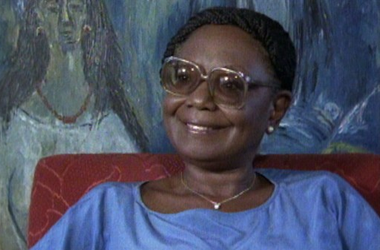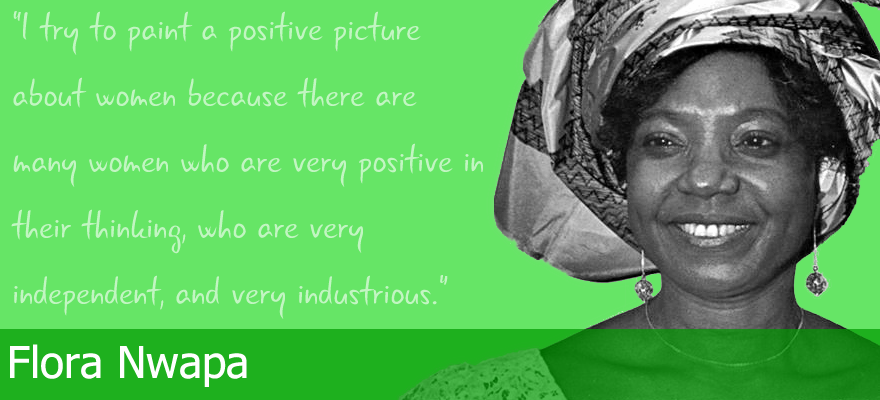Florence Nwanzuruahu Nkiru Nwapa was a Nigerian writer, teacher and administrator, as well as a forerunner of a generation of African women writers best-known for broaching the topics of African life and traditions from a woman’s viewpoint. With Efuru, Nwapa became Africa’s first internationally published female novelist in the English language.
Early Life
Nwapa was born on January 13, 1931 in Oguta, Imo State into a wealthy and influential family. She was the first daughter of six children. Her parents, Christopher and Martha Nwapa, were both teachers. She attended primary and secondary school in Oguta, Elelenwa in Rivers State, and Lagos. She studied English, History and Geography at University College, Ibadan (now the University of Ibadan) from 1953 to 1957. In 1958, Nwapa attended the University of Edinburgh where she obtained a Diploma in Education.
After returning from Scotland, she became an education officer in Calabar. In 1959, she became a Geography and English teacher at Queen's School, Enugu. From 1962 to 1967, she held the position of assistant registrar at the University of Lagos. When the Nigerian Civil War broke out in 1967, she left Lagos with her family and, like many members of the Igbo elite, returned to the Eastern Region. Nwapa was married to Chief Gogo Nwakuche, a businessman with whom she had three children. Although he took other wives, she remained Nwakuche's first wife. She did not leave or divorce him because she wanted her children to be raised by their father.
Writing and Publishing Career
Nwapa made her literary debut with the novel Efuru, which is based on an old folktale about a woman chosen by the sea goddess to be her worshipper. The book, which she began in 1962, was the first novel published by a Nigerian woman in English and challenged traditional portrayals of women. The central character, Efuru refuses to resign to fate and tradition because of the challenges she faces from her two marriages, demonstrating that a woman can survive with or without a man in her life. The novel was published in 1966 by Heinemann Educational Books as part of theAfrican Writers Series after consultation with her good friend Chinua Achebe, who edited the series. A year earlier, she had been made the secretary of the Society of Nigerian Authors (now the Association of Nigerian Authors - ANA), of which Achebe was the president. Nwapa's second novel, Idu (1970), is a story about a woman whose life is bound up with that of her husband. When he dies, she chooses to seek him out in the land of the dead rather than live without him. The war novel Never Again (1975), which was her third book, drew its material from the Nigerian Civil War.
Over the course of twenty-seven years, Nwapa published six novels, nine children's books, three plays, two collections of short stories, a book of poems and innumerable essays. Some of these works include One is Enough (1981), This is Lagos and Other Stories (1971), Cassava Song and Rice Song (1986), Wives at War and Other Stories (1980), Driver's Guard (1972), Mammywater (1979), Journey to Space (1980), The Adventures of Deke (1980), and Women Are Different (1986).
At the time of her death, Nwapa had completed The Lake Goddess, her final novel, and had entrusted the manuscript to a friend. It was published posthumously in 1995.
Apart from writing books, Nwapa, with the help of her husband, established herself as a publisher by launching Tana Press in 1976 after becoming dissatisfied with her publisher. The company, which published adult fiction, was the first indigenous publishing house owned by a black African woman in West Africa. Between 1979 and 1981 she had published eight volumes of adult fiction. Nwapa set up also another publishing company, Flora Nwapa and Co., which specialised in children’s fiction. With these books, she combined elements of Nigerian culture with general moral and ethical teachings.
With regards to her political views, Nwapa considered herself a womanist - a term coined by the American writer Alice Walker in her collection of essays In Search of Our Mothers' Gardens: Womanist Prose (1983) - rather than a feminist in the Western sense. She encouraged other women with her own example to break the traditional female roles of wife and mother and to strive for equality in society through entrepreneurship. She has often been called the mother of modern African literature.
Public Service
Nwapa is also known for her governmental work in reconstruction after the Nigerian Civil War. She served as Minister for Health and Social Welfare for the East Central State (which now comprises Imo, Enugu, Anambra, Ebonyi and Abiastates) from 1970 to 1971. In this role, she found homes for two thousand war orphans. She also served as Commissioner for Lands, Survey and Urban Development from 1971 to 1974.
Honours and Awards
In 1983, the Nigerian government bestowed on her the OON (Officer of the Order of Niger), one of the country’s highest honours. She received the University of Ife (now Obafemi Awolowo University) Merit Award for Authorship and Publishing at the 1985 Ife Book Fair. In 1989, she was appointed Visiting Professor of Creative Writing at the University of Maiduguri in Borno State, a position she held until her death. She was a member of the PEN International committee in 1991 and the Commonwealth Writers' Prizes committee in 1992. She was awarded the highest chieftaincy title (Ogbuefi) by her hometown, an honour that is usually reserved for men of achievement.
Death
On October 16, 1993, Nwapa died of pneumonia at the University of Nigeria Teaching Hospital, Enugu at the age of 62. She was laid to rest in her hometown of Oguta, the place which inspired much of her writing.
Sources
Picture sources: NRK TV and Abiyamo


